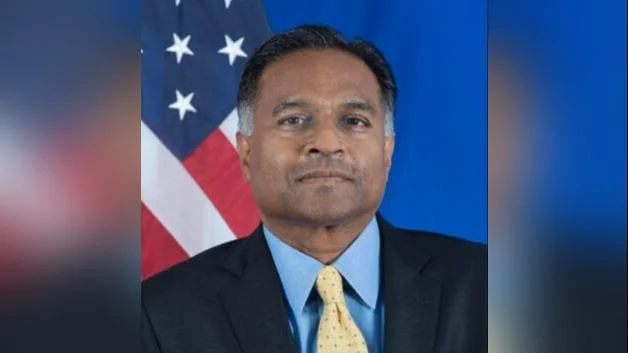Ambassador Gautam Rana addressed the Bratislava Legal Forum, discussing the challenges and opportunities posed by rapid technological advancements in cybersecurity and artificial intelligence (AI). Drawing on his background as a staff attorney in New York City before joining the Foreign Service, Rana highlighted how law has historically adapted to innovation, from the printing press to nuclear energy.
Rana outlined current U.S. policy approaches under President Trump’s administration. He described a recent executive order signed on June 6 that reprioritizes American cybersecurity efforts. “It directs federal agencies to adopt the National Institute of Standards and Technology’s Secure Software Development Framework and update federal standards for secure software development practices. In plain terms, this means that the U.S. government is insisting on secure-by-design software, with security and privacy built in from the start,” he said.
The executive order also prepares for quantum-resistant cryptographic algorithms to address potential vulnerabilities from future quantum computers, introduces technical guidance to improve network traffic routing security for federal networks, and establishes a consumer security labeling program for connected IoT devices through the U.S. Cyber Trust Mark program. The order narrows cyber sanctions to focus solely on foreign malicious actors.
“The guiding principle is simple: cybersecurity must not become politicized. It must remain about technical resilience and the defense of citizens and infrastructure,” Rana stated.
He referenced testimony from Sean Cairncross, National Cyber Director, emphasizing that effective cybersecurity relies not only on technology but also cooperation among governments, industry, and civil society. “Cybersecurity is also about people and relationships... Protecting networks requires cooperation across governments, industries, and civil society,” Rana quoted Cairncross.
Addressing persistent threats from adversaries targeting critical infrastructure worldwide—including attacks seen in Slovakia—Rana underscored the importance of international partnerships such as NATO and EU collaborations: “In today’s integrated world... we are only as strong as our weakest link.”
Turning to AI policy, Rana discussed President Trump’s July 23 unveiling of “Winning the AI Race: America’s AI Action Plan.” The plan covers innovation investments, regulatory sandboxes or “Centers of Excellence,” expedited permitting for data centers and semiconductor facilities, workforce training initiatives, export promotion of full-stack American AI technology packages to allies worldwide, and sector-specific regulation instead of broad horizontal frameworks like Europe’s AI Act.
He noted key executive orders prohibiting procurement of ideologically biased AI models by government agencies; accelerating construction of data centers; promoting exports; and supporting partners with financing tools such as loans or equity investments so they can adopt trusted systems suited to national needs.
“Our export program is designed for mutual benefit: strengthening friendships, empowering our partners’ innovation, and securing a peaceful future of shared prosperity,” said Rana.
On energy infrastructure's role in digital innovation resilience—a priority both in Slovakia and the United States—Rana explained that reliable power underpins both cybersecurity measures and advanced technologies like AI.
Finally, comparing regulatory approaches between Europe and America regarding AI oversight—horizontal versus sector-specific—he stressed convergence around shared goals: ensuring safety while respecting democratic values.
“Friends, cybersecurity is the foundation of our digital lives. AI is the frontier that will shape our economies... And a reliable energy supply is key to making both possible,” he concluded.

